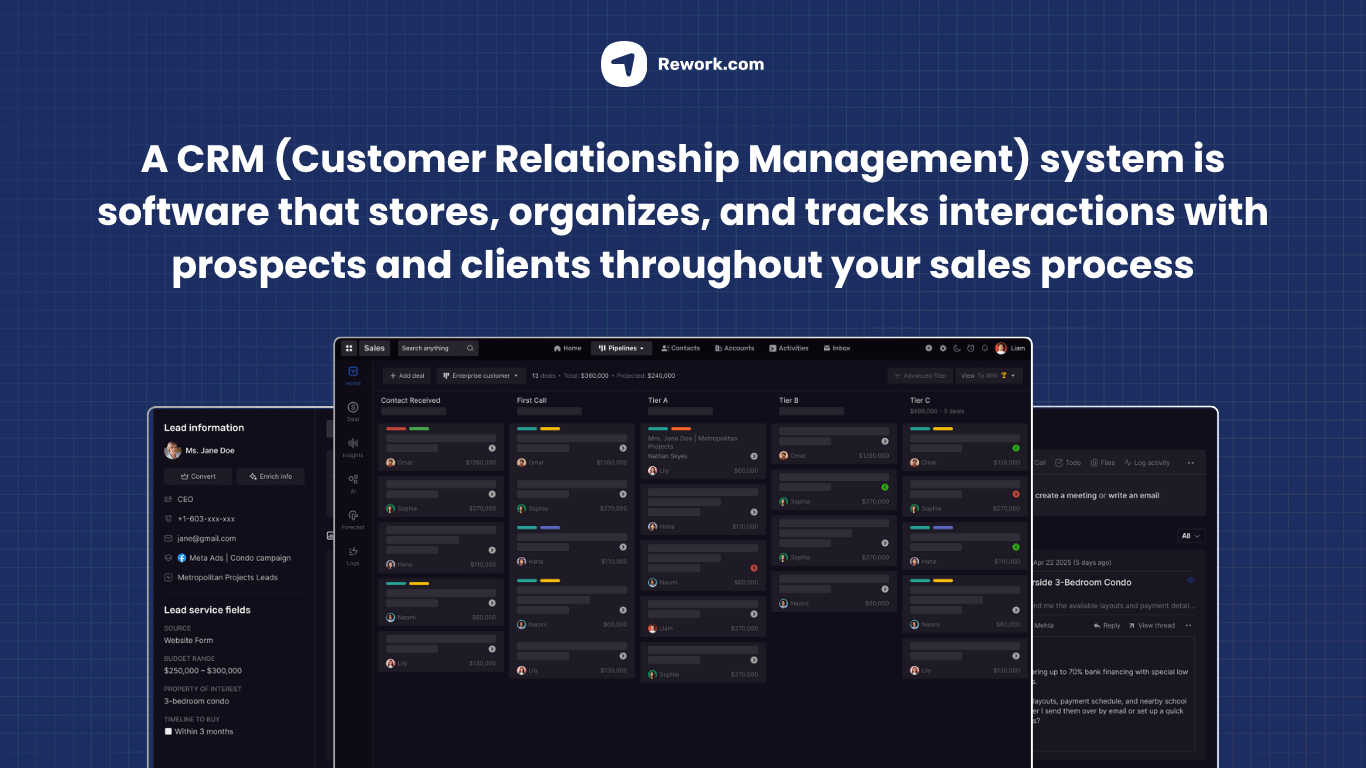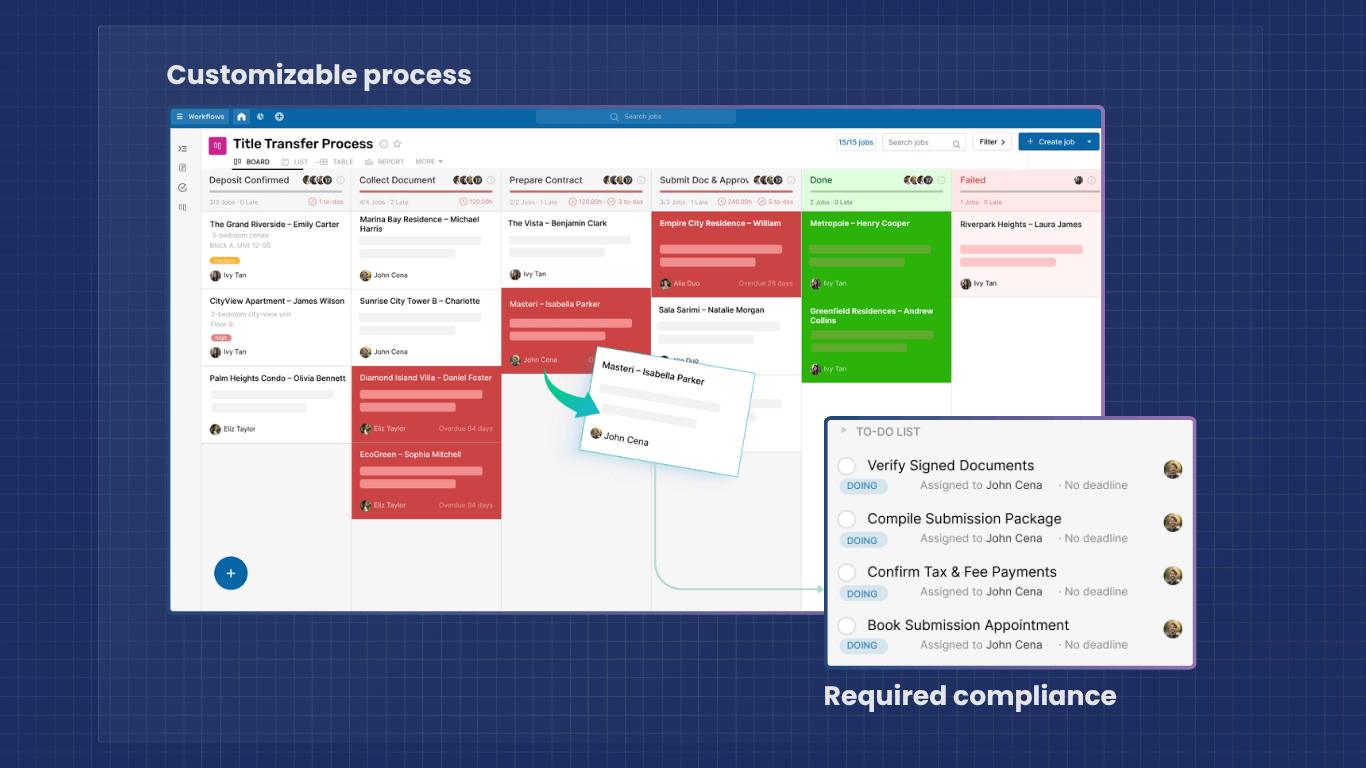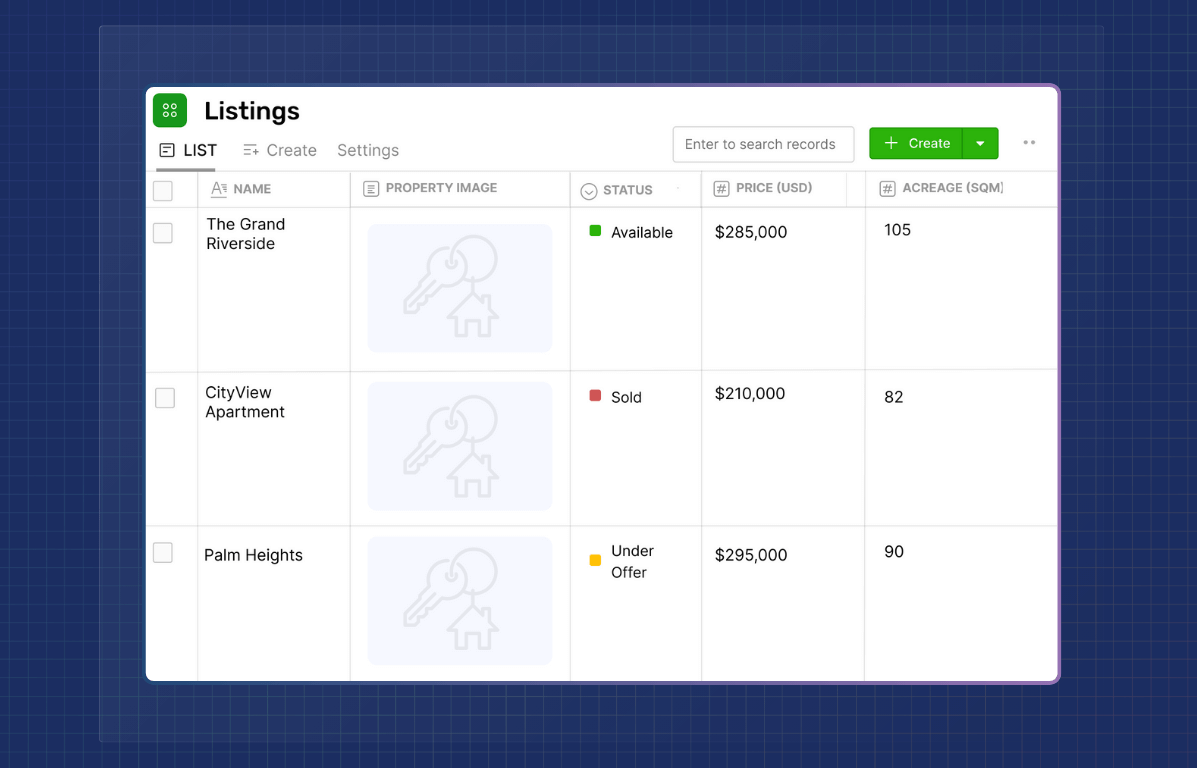Rework Journeys

How to grow your real estate business without chaos: 3 essential systems
You might have a successful agency with 5-10 agents closing deals consistently. Revenue is good, clients are happy, and everything feels manageable. But when you try to grow beyond that point - adding more agents, expanding to new markets, or increasing transaction volume - suddenly everything starts breaking down. The systems that worked when you were small don't work when you're bigger.
Most brokers think that they need to just work harder for their business to grow. Wrong.
What could stall your real estate business from scaling?
Here's something most real estate business owners don't see coming: there's a hidden chasm that appears when you try to scale from a small team to a larger operation. It's called the scale-up chasm, and it's where many promising real estate businesses get stuck.
This isn't unique to real estate - it happens across industries when businesses hit certain growth thresholds. But real estate has its own specific challenges that make this chasm particularly treacherous.
The three main blockages that prevent your real estate from scaling
Most real estate businesses get trapped by the same three fundamental problems when they try to scale:
Blockage #1: No sales playbook - over-reliance on superstar salespeople
You probably have that one agent who seems to close everything they touch. They have their own methods, their own relationships, their own way of handling clients. When they're successful, it feels like proof that your business model works.
But here's the problem: their success isn't scalable. It lives in their head, not in your systems.
When you try to hire new agents, they can't replicate that superstar's results because there's no documented process to follow. You can't train new people effectively because the "system" is actually just one person's instincts and experience.
This creates a dangerous dependency. Your business growth is limited by how many deals your top performers can personally handle. If they leave, they take their methods and relationships with them.
Blockage #2: Burdened admin work that slows down the process
As you grow, the administrative burden grows exponentially. More agents mean more transactions. More transactions mean more paperwork, more deadlines to track, more client communications, and more compliance requirements.
What happens is your best people - the ones who should be focusing on high-value activities like building relationships and closing deals - get bogged down in administrative tasks. You're paying top performers to do work that could be systematized and automated.
Blockage #3: Overwhelming and scattered data
Small real estate teams can get away with keeping information in their heads, personal spreadsheets, or informal systems. But as you scale, data becomes critical, and scattered data becomes dangerous.
Client information lives in one place, property details in another, transaction status in a third system. Some agents use their own tools, others rely on company systems, and important information gets lost in the gaps.
When information isn't centralized, clients have to repeat themselves, agents can't access the complete history, and the professional experience you want to deliver becomes impossible to maintain consistently. Worst, without centralized, accurate data, you're making decisions blind.
I am about to show you the three systems that take real estate agents from feeling overwhelmed and reactive to instead finally feeling in control without working more hours.
The CRM system: Your relationship command center
Here's the question for you: Do you know where your leads are coming from? Do you know what you have to do each day to bring them in? Do you know what to say to convert them into clients for life? If not, you're missing this first system, and you've got to do some work there.
What is a Real estate CRM? What does a real estate CRM do?

A real estate CRM (Customer Relationship Management system) is software that tracks every person you've ever talked to about real estate - past clients, current leads, people who might buy or sell someday - and what stage they're at with you.
Think of it as a smart database that remembers things you'd otherwise forget. You can grow without your head exploding. When you're juggling 30 active clients and 50 warm leads, your brain can't track it all. Your CRM can. It knows who needs attention today, who's waiting on documents, and who you promised to call on Thursday.
The real benefits of a proper CRM system for scaling your business
However, more than just a contact database, a CRM is the brain of your entire growth operation. A CRM turns sales from a guessing game into a repeatable process that any agent on your team can follow.
It's where you build your sales playbook. You can set up standardized contact fields (budget, timeline, property preferences), a standardized pipeline (first contact → qualified → showing → offer → closing), and standardized to-dos at each stage. When a new lead comes in, your CRM tells your agent exactly what to do next. No more making it up as they go.
Automatic sequences let new agents sell like your top performers. Your best agent always calls leads within 5 minutes and follows up three times? Program that into the CRM. Now every agent does it. Your top closer sends a specific email series that converts 30% of cold leads? Set it up once, and it runs for everyone. You're not relying on one superstar anymore - you're cloning what works.
What’s best is that it captures the full history, so you can actually learn from your data. Which lead sources bring in the best clients? Which agents close the highest percentage of their prospects? Which follow-up messages get the best response rates? Without a CRM, you're guessing. With one, you know.
Your sales process lives in your CRM. Without it, every agent invents their own approach, and you have no idea why some succeed and others fail. With it, you can teach any decent agent to perform like your best one.
The process management system: Handling the complex back-office work
Here's what nobody tells you about real estate: closing the deal is just the beginning. What happens after a client says "yes" is often more complex than everything that came before.
Take the title transfer process. In some markets, this can involve 15+ different steps, multiple government offices, banks, lawyers, and weeks of back-and-forth paperwork. Miss one deadline or forget one document, and the whole deal can fall apart.
However, most real estate businesses handle post-sale processes the same way they did 20 years ago: phone calls, emails, spreadsheets, and hoping nothing falls through the cracks.
When title transfers, mortgage approvals, and document collection happen manually, important deadlines get missed. Meanwhile, clients lose confidence when they don't know what's happening. Real estate transactions are stressful enough. When clients have to keep calling to find out if their paperwork is moving along, they start wondering if they chose the right agency.
A process management system fixes the admin chaos that kills your momentum and slows down closings.
It centralizes everything in one place. All your transaction documents, client conversations, landlord communications, and inspection reports - they all live in the same system. Your agent knows where to find the signed contract. Your transaction coordinator can see the appraisal status. You can check compliance without asking anyone. No more "Where's that document?" or "Did we get the inspection report?" Everyone sees the same information at the same time.
Plus, it reminds you about deadlines and compliance requirements automatically. Inspection due in 3 days? The system alerts the agent. Title review pending? Your coordinator gets notified. Compliance documents missing? You see a red flag. You're not relying on people to remember everything - the system tracks it and tells you what needs attention before it becomes a problem.
A good process management system should be able to integrate with your CRM for smooth handoffs. When a deal moves from "offer accepted" in your CRM to "in escrow" in your process system, all the client data flows automatically. Contact info, property details, special requirements - your transaction team gets everything they need without anyone retyping information or hunting down details. The sale-to-operations handoff that used to eat up hours now takes seconds.
Your team spends their time closing deals instead of chasing paperwork and playing email tag.

The listing management system: Your inventory backbone
If you’ve been working in the real estate business for a while, I bet you know that having great properties to show is often more important than being great at selling.
I learned this from an agent who told me, "When I have the right property for someone, they practically sell themselves. When I don't have good options, even my best sales skills can't save the conversation."
Your listing management system is how you make sure you always have good options to back up your growing sales team.

Why spreadsheets don't work for listings
Most agencies start tracking listings in spreadsheets. It works when you have five properties. It breaks down when you have fifty.
Properties have too many moving parts for simple spreadsheets. Location, price, availability, features, photos, status changes, competing properties, market conditions - it's too much data to manage manually.
And when information is spread across multiple spreadsheets (or worse, multiple agents' personal files), nobody has the complete picture.
A listing management system solves the scattered data problem that makes you look disorganized and miss opportunities.
All your property information lives in one searchable place. Specs, photos, virtual tours, price changes, showing feedback, marketing stats—everything is attached to the property record. When a buyer asks about a listing, your agent pulls up complete information in seconds instead of searching through folders and old emails. When you need to update pricing across multiple platforms, you change it once and it updates everywhere.
What’s better is you can actually see what's working across your inventory. Which listings are getting showings? Which price points are moving fast? Which neighborhoods are hot right now? Which marketing channels drive the most buyer interest? Your listing system tracks all of it in real time. You stop guessing and start making decisions based on what the data shows you.
Finding the right platform for your systems
You could try to piece together three separate systems. Some agencies do this. They use one tool for CRM, another for project management, and a third for listings.
The problem is integration. Getting three different systems to talk to each other reliably is harder than most people expect. Data gets duplicated or lost in translation. Your team has to learn multiple interfaces. Updates in one system don't automatically flow to the others.
What works better is finding a platform that handles all three functions in a connected way.
This is where Rework comes in. Instead of forcing you to manage multiple tools, Rework gives you integrated CRM, process management, and data management in one platform, giving you a centralized view and workspace of your real estate business. What’s best is that Rework offers the flexibility so you can always customize the system permission settings and design to fit your scale-up context.
Getting started with systematic growth
You don't need to transform everything overnight. The best approach is to start with whichever system is causing you the most pain right now.
If you're losing track of leads, start with CRM. If the admin work is overwhelming and there’s no standard in how different departments collaborate, focus on process management first. If you're always scrambling to find good properties to show, begin with listing management.
Just remember: the goal isn't to add more work for your team. It's to make their existing work more effective. The right systems should make your people more productive, not give them more things to manage.
Your real estate business has the potential to grow systematically instead of chaotically. It starts with getting these three foundational systems working together.
What's your next step going to be?

Camellia
Content Strategist
On this page
- What could stall your real estate business from scaling?
- The three main blockages that prevent your real estate from scaling
- The CRM system: Your relationship command center
- The process management system: Handling the complex back-office work
- The listing management system: Your inventory backbone
- Finding the right platform for your systems
- Getting started with systematic growth